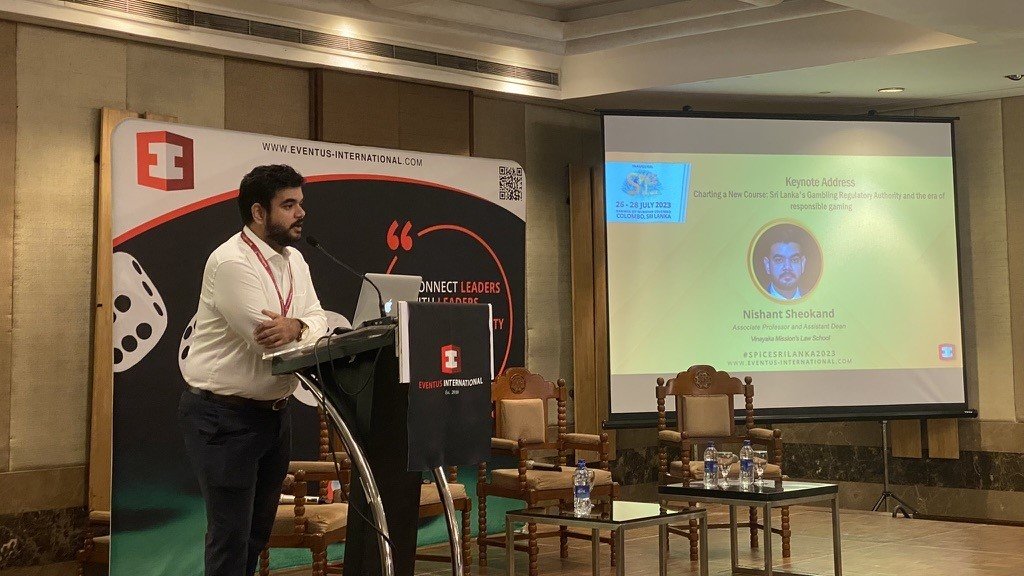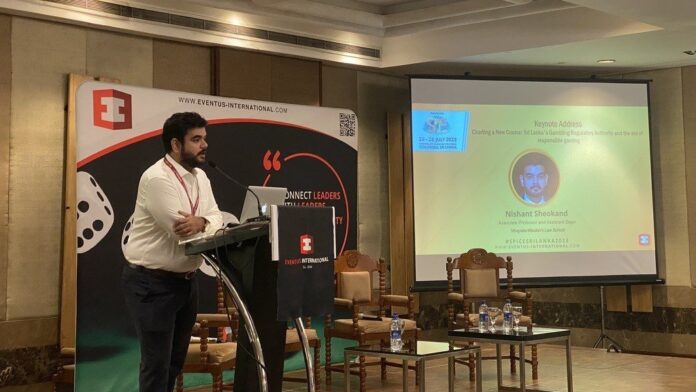
SPiCE Sri Lanka, a three-day gambling event held in Colombo from 26 – 28 July, sounded the alarm over Sri Lanka’s struggles in establishing a Gambling Regulatory Authority (GRA), calling for urgent action to address the mounting challenges faced by the nation’s gambling industry.
Delivering the keynote address during the second day of the meeting on Thursday (27), Nishant Sheokand, a Sports Law and Gaming Consultant and an Associate Professor and Assistant Dean at Vinayaka Mission’s Law School, shed light on the complex journey of the Casino Act, the political opposition, and the uncertainties surrounding the GRA’s implementation.
“The lack of clear regulations in the gambling sector has created an environment rife with risks. Online gambling, in particular, has surged in Sri Lanka due to the forced digital transformation during the pandemic. Without proper safeguards, this could lead to harmful consequences for individuals and society at large,” Sheokand emphasized.
The Cabinet of Ministers of Sri Lanka recently initiated the process of introducing a bill to officially recognize and regulate gaming in the country, responding to the industry’s substantial growth in recent years.
Sheokand expressed deep concern over the stigma attached to certain gambling activities, which may impede the GRA’s success in promoting responsible gaming. “Addressing the negative perceptions around gambling is crucial. Players of skill-based games like poker and Teen Patti are often unfairly stigmatized, hindering the growth of a regulated industry,” the expert remarked.
“The lack of resources and expertise within the industry poses a significant challenge. Additionally, the distinction between skill-based and chance-based games remains a contentious issue,” he asserted.
Sheokand also raised concerns about the government’s ability to navigate potential opposition from the gaming industry and the impact of political changes on the GRA’s progress. “Sri Lanka’s history with attempts to regulate gambling has been marked by wavering policies due to changes in regimes. This could affect the commitment to the GRA in the future,” he warned.
The Casino Act, which came into play in Sri Lanka in 2010, faced staunch opposition from political parties and cabinet members, delaying its implementation and creating a climate of uncertainty for investors.
The recent announcement to establish the GRA aims to address the existing regulatory void, especially in the realm of online gambling, which has surged due to the COVID-induced digital transformation.
To ensure the GRA’s efficacy, Sheokand emphasized the importance of adopting international best practices and learning from the experiences of other countries that have successfully regulated their gambling industries. “Collaborating with experts from various disciplines, including economics, law, and social sciences, could lead to comprehensive and balanced regulations,” he stated.
“The proposed GRA holds the promise of several benefits for the nation. Enhanced transparency and accountability in the gambling industry would lead to greater public trust and confidence,” Sheokand highlighted. “Improved consumer protection measures would safeguard individuals from potential harm, including addiction and exploitation. Furthermore, the collection of taxes from gambling activities could contribute to increased government revenue.”
As the nation navigates the complexities and challenges ahead, Sheokand’s urgent call for swift action rings loud, urging policymakers to prioritize the implementation of clear and effective regulations to safeguard the nation’s economic and social well-being.
The GRA’s success will be contingent on political stability and continuity in the country. Sri Lanka’s history with regulatory attempts has been marked by policy changes and political shifts, leading to a climate of uncertainty.
On day two of SPiCE Sri Lanka, the spotlight shined on the opportunities within Sri Lanka’s gaming industry, the future trajectory of land-based casinos, and the evolving landscape of the lottery sector. Several online gaming booths were featured in the event, further confirming the interest in expanded gambling in the nation.














